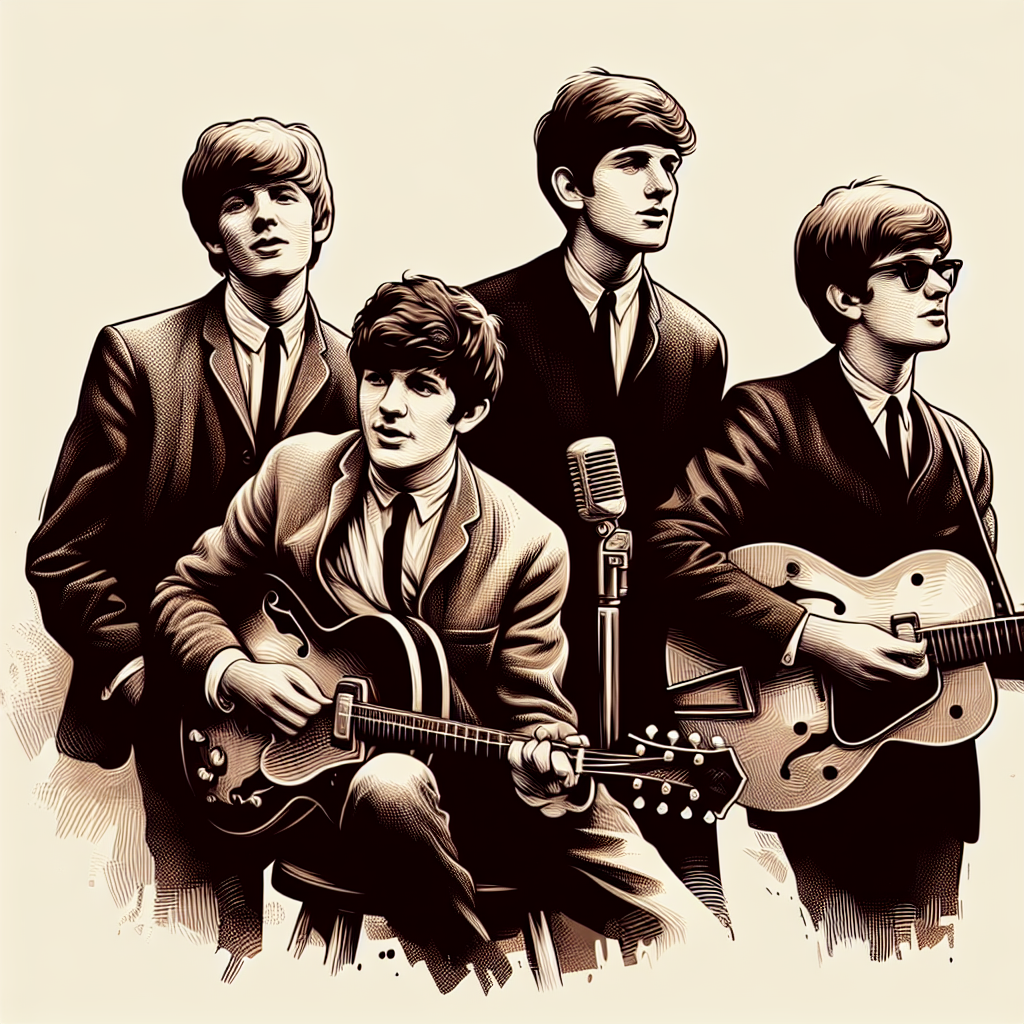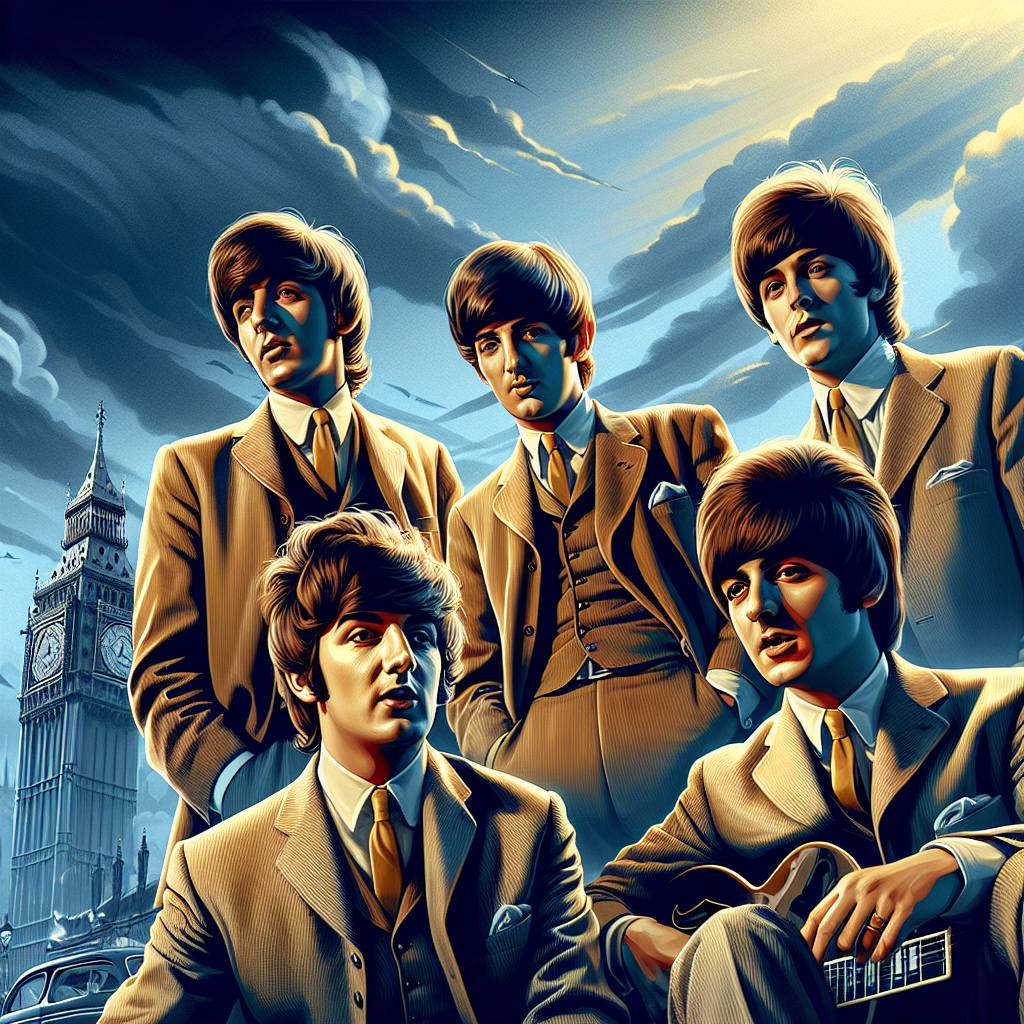If you’re a fan of iconic music and legendary bands, then you’ve definitely heard of the Beatles. And there’s no way you can discuss the Beatles without mentioning their extraordinary lead singer. From their humble beginnings in Liverpool to becoming a global sensation, this article will take you on a journey through the rise of the Beatles and the remarkable talent behind their success. So get ready to immerse yourself in the story of a band that changed the face of music forever. Disclosure: As an Amazon Associate, I earn from qualifying purchases.
The Early Years of the Beatles
The Beatles, one of the most iconic and influential bands in the history of music, had humble beginnings that laid the foundation for their extraordinary success. This article explores the formation of the band, origin of their name, and their early influences and musical style.

Formation of the Band
The Beatles first came together in Liverpool, England in 1960. The band was initially composed of four members: John Lennon, Paul McCartney, George Harrison, and Pete Best. They started off as a skiffle group called the Quarrymen, playing small gigs and events around Liverpool.
Origin of the Band’s Name
As the band evolved and gained popularity, they decided to change their name. After considering various options, they settled on “The Beatles.” This name was a clever play on words, combining the idea of “beat” music with the insect connotation of “beetles.” It was a nod to their rock and roll style and also a wordplay on the English word “beat,” which was often associated with the energetic rhythm of their music.
Early Influences and Musical Style
The Beatles drew inspiration from a wide range of musical genres, including rock and roll, rhythm and blues, and skiffle. They were heavily influenced by artists such as Chuck Berry, Little Richard, and Buddy Holly. These early influences shaped their musical style, characterized by catchy melodies, harmonies, and energetic rhythm sections.
The Beatles’ Impact on the Music Industry
The Beatles’ impact on the music industry cannot be overstated. They pushed boundaries, explored new sounds and techniques, and revolutionized the concept of a boy band. They also played a pivotal role in the evolution of album production.
Exploring New Sounds and Techniques
One of the key factors that set the Beatles apart was their constant experimentation with new sounds and techniques. They were not afraid to push the boundaries of what was considered traditional in popular music. Their innovative use of instrumentation, such as the sitar in “Norwegian Wood,” and their groundbreaking studio techniques, such as backward tape loops in “Tomorrow Never Knows,” opened up new sonic possibilities and influenced generations of musicians to come.
Revolutionizing the Concept of a Boy Band
Before the Beatles, boy bands were often manufactured acts with little creative control. The Beatles changed this perception by demonstrating their musical talent and songwriting abilities. They wrote and performed their own songs, showcasing a level of authenticity and artistic integrity that was unprecedented for a boy band. They proved that a boy band could be more than just a group of handsome young men; they could be talented musicians and songwriters capable of producing timeless music.
Evolution of Album Production
The Beatles played a crucial role in the evolution of album production. Prior to their time, albums were generally seen as a collection of singles with filler tracks. The Beatles challenged this notion by releasing albums that were cohesive bodies of work, where every song mattered. Their groundbreaking albums such as “Sgt. Pepper’s Lonely Hearts Club Band” and “Abbey Road” showcased their ability to create a narrative and thematic flow within an album, elevating the album as an art form and influencing the way future artists approached album production.
The Beatles’ Breakthrough Album
The Beatles’ breakthrough album, “Please Please Me,” marked a significant turning point in their career. This section explores the recording and release of the album, its chart success and fan reception, and its impact on British pop music.

Recording and Release of ‘Please Please Me’
“Please Please Me” was the Beatles’ debut studio album, released on March 22, 1963. It was recorded in a single day and captured the raw energy and charisma of the band’s live performances. The album featured a mix of original compositions by Lennon-McCartney and cover songs. It showcased the tight harmonies, infectious melodies, and energetic delivery that would become synonymous with the Beatles’ sound.
Chart Success and Fan Reception
Upon its release, “Please Please Me” immediately shot to the top of the charts in the United Kingdom. It stayed at number one for an impressive 30 weeks, solidifying the Beatles’ status as a force to be reckoned with in the music industry. Fans were captivated by the Beatles’ catchy tunes, irresistible charm, and unprecedented blend of musical talent. The album received widespread critical acclaim, with many praising the band’s unique sound and songwriting abilities.
Impact on British Pop Music
“Please Please Me” had a profound impact on the British pop music scene. It helped establish a new sound and direction for popular music, influencing countless aspiring musicians and bands. The album’s success paved the way for the Beatles to become the poster boys of the “British Invasion,” a wave of British bands that would take the American music scene by storm in the mid-1960s.
The Beatles’ Transition to International Success
After conquering the UK music scene, the Beatles set their sights on international success. This section delves into their journey of breaking into the U.S. music scene, their influence on the “British Invasion,” and their landmark performances and television appearances.

Conquering the U.S. Music Scene
The Beatles’ arrival in the United States in February 1964 is widely regarded as one of the most significant events in the history of popular music. Their appearance on The Ed Sullivan Show on February 9, 1964, attracted an estimated 73 million viewers, introducing the “Fab Four” to American audiences and igniting a nationwide phenomenon known as Beatlemania. Their infectious energy, catchy tunes, and youthful charm made them instant sensations, catapulting them to the top of the American music charts and solidifying their status as global superstars.
Influence on the ‘British Invasion’
The Beatles’ success in the United States paved the way for other British bands to achieve international recognition. This wave of British acts, known as the “British Invasion,” included bands such as The Rolling Stones, The Who, and The Kinks. The Beatles’ unprecedented popularity and cultural impact served as a catalyst for the British Invasion, forever changing the landscape of popular music in the United States and around the world.
Landmark Performances and Television Appearances
Throughout their career, the Beatles delivered numerous iconic performances that left an indelible mark on popular music history. From their legendary rooftop concert in London to their groundbreaking performance at Shea Stadium in New York, the Beatles pushed the boundaries of live music and set new standards for stage presence and showmanship. Their appearances on popular television shows, such as The Ed Sullivan Show and The Beatles’ Animated TV Series, further solidified their status as global icons and helped shape the way music was experienced and consumed.
The Lead Singer: John Lennon
As the lead singer of the Beatles, John Lennon played a pivotal role in the band’s success. This section provides insights into his background and early life, his role as the primary songwriter, and his distinctive vocal style.

Background and Early Life
Born on October 9, 1940, in Liverpool, England, John Lennon grew up in a working-class family. His passion for music was nurtured from a young age, and he began playing the guitar and writing songs in his teenage years. Lennon’s rebellious nature and artistic inclinations set him on a path that would ultimately lead to the formation of the Beatles.
Role as the Primary Songwriter
John Lennon had an innate talent for songwriting and served as the primary songwriter for the Beatles alongside Paul McCartney. Together, Lennon and McCartney created some of the most iconic songs in popular music history. Lennon’s songwriting often reflected his introspective and philosophical nature, addressing themes such as love, peace, and social commentary. His distinctive style, characterized by honest lyrics and memorable melodies, contributed significantly to the Beatles’ success and enduring legacy.
Distinctive Vocal Style
John Lennon’s vocal style was unmistakable and played a crucial role in defining the Beatles’ sound. His raw and emotive delivery added depth and authenticity to their songs. Lennon’s vocals possessed a unique blend of vulnerability and power, allowing him to convey a range of emotions effectively. From the soulful crooning in “Julia” to the raucous energy in “Twist and Shout,” Lennon’s vocal versatility left an indelible impression on listeners worldwide.
The Evolution of the Beatles’ Sound
The Beatles’ sound underwent a remarkable evolution throughout their career, driven by their constant experimentation and willingness to push musical boundaries. This section explores their exploration of psychedelic rock, incorporation of Indian and Eastern influences, and their contributions to studio innovations and technological advances.

Experimentation with Psychedelic Rock
In the mid-1960s, the Beatles entered an experimental phase, embracing the psychedelic rock movement that was sweeping the music industry. Albums such as “Revolver” and “Sgt. Pepper’s Lonely Hearts Club Band” showcased their foray into this genre, characterized by unconventional song structures, trippy lyrics, and innovative studio techniques. The use of instruments such as the Mellotron and the inclusion of backward tape loops demonstrated the Beatles’ willingness to push the boundaries of what was considered acceptable in popular music.
Incorporating Indian and Eastern Influences
The Beatles’ fascination with Indian culture and spirituality significantly influenced their music. Inspired by their association with Maharishi Mahesh Yogi and their trip to India in 1968, the band incorporated Indian instruments, such as the sitar, and Eastern musical elements into their compositions. Songs like “Norwegian Wood” and “Within You Without You” showcase their exploration of Indian raga and Eastern philosophies, adding a new dimension to their sound and expanding the possibilities of popular music.
Studio Innovations and Technological Advances
The Beatles were pioneers in the realm of studio innovations and technological advances. Working closely with producer George Martin and utilizing the cutting-edge equipment available at Abbey Road Studios, they pushed the boundaries of what could be achieved in the studio. From the use of tape loops and multi-tracking to the exploration of backward recordings and artificial double tracking, the Beatles revolutionized the recording process. Their innovative use of studio techniques opened up new creative possibilities and forever changed the way music was produced.
The Impact of the Beatles’ Lyrics
In addition to their musical innovations, the Beatles’ lyrics played a pivotal role in shaping the cultural landscape of their time. This section explores the themes of love, peace, and social commentary present in their lyrics, the evolution of their lyrical content, and their enduring relevance and legacy.
Themes of Love, Peace, and Social Commentary
Love, peace, and social commentary were recurring themes in the Beatles’ lyrics. Their early songs predominantly revolved around themes of love and romance, characterized by heartfelt and often optimistic portrayals of relationships. As their careers progressed, however, the Beatles started to delve into more substantial subjects, offering social commentary and reflecting the spirit of the times. Songs like “Revolution” and “Blackbird” addressed issues of war, civil rights, and inequality, showcasing the Beatles’ willingness to use their platform to advocate for change.
Evolution of Lyrical Content
The Beatles’ lyrical content underwent a significant evolution throughout their career. Their early songs were often simple and straightforward, capturing the spirit of youthful romance. However, as the band matured and became more introspective, their lyrics became more complex and layered. Their experiences, personal growth, and the changing social and political climate of the 1960s influenced the depth and sophistication of their songwriting. From the introspective musings of “In My Life” to the poetic abstraction of “Across the Universe,” the Beatles’ lyrics evolved alongside their musical experimentation.
Relevance and Enduring Legacy
The Beatles’ lyrics continue to resonate with audiences of all generations. Their messages of love, peace, and social commentary remain relevant in today’s world. The universal themes and timeless quality of their songs have ensured their enduring legacy. Whether it be the idealistic optimism of “All You Need Is Love” or the introspective introspection of “Let It Be,” the Beatles’ lyrics continue to inspire and connect with listeners around the globe.
The Beatles’ Legacy and Cultural Impact
The Beatles’ influence extends far beyond their music. This section explores their profound impact on future musicians and bands, their social and political influence, and their immense contribution to pop culture.
Influence on Future Musicians and Bands
The Beatles’ innovative approach to songwriting, studio recording, and live performances set the stage for countless musicians and bands to follow in their footsteps. Their melodic sensibilities, experimental spirit, and fearless exploration of new sounds continue to inspire artists across genres. Bands like Oasis, Coldplay, and Radiohead have cited the Beatles as a major influence, demonstrating the enduring impact of their music on future generations of musicians.
Social and Political Influence
During the turbulent 1960s, the Beatles found themselves at the center of social and political movements. Their music became synonymous with the counterculture and the spirit of peace and love. Their anti-war stance and support for the civil rights movement resonated with a generation of fans, who looked up to them as not just musical icons but also social and political influencers. The Beatles’ influence extended beyond music, helping to shape the cultural and political landscape of their time.
Contribution to Pop Culture
The Beatles’ impact on pop culture cannot be overstated. Their distinctive image, unique fashion sense, and charismatic personalities made them cultural icons. They played a significant role in pioneering the concept of the modern music video, with innovative films such as “A Hard Day’s Night” and “Help!” Their influence on fashion, hairstyle trends, and overall popular culture has left an indelible mark on generations of fans.
The Beatles’ Personal Relationships Within the Band
The Beatles’ success can be attributed not just to their musical talents but also to their strong personal relationships within the band. This section delves into their friendship and camaraderie, their creative collaborations, and the rumors and controversies that surrounded the band.
Friendship and Camaraderie
The Beatles’ bond as friends and bandmates was a key factor in their success. From their early days in Liverpool to their rise to international stardom, the band members shared a deep sense of camaraderie and friendship. They supported each other creatively and emotionally, pushing each other to reach new heights. Their collaborative spirit and mutual respect for one another created a strong foundation that allowed the Beatles to navigate the challenges of fame and remain a cohesive unit throughout their career.
Creative Collaborations
The creative collaborations between the members of the Beatles were integral to their success. John Lennon and Paul McCartney formed one of the most celebrated songwriting duos in music history. Their ability to bounce ideas off each other and complement each other’s strengths led to the creation of countless timeless songs. George Harrison’s songwriting contributions also added depth and diversity to the band’s repertoire. The dynamic between the band members allowed them to constantly challenge and inspire each other, resulting in an unparalleled body of work.
Rumors and Controversies
As one of the biggest bands in the world, the Beatles faced their fair share of rumors and controversies. From false claims of Paul McCartney’s death to tensions within the band, there were moments when the Beatles’ harmonious image was called into question. However, despite the occasional rumors and controversies, the band weathered the storm and remained united, further cementing their legacy as one of the greatest bands of all time.
The Beatles’ Disbandment and Solo Careers
The Beatles’ journey came to an end in 1970, but their individual careers as solo artists would continue to shape the musical landscape. This section explores the reasons behind the band’s breakup, their solo projects and musical ventures, and the lasting legacy of the individual band members.
Reasons for the Band’s Breakup
The disbandment of the Beatles was a result of a combination of factors, including creative differences and personal tensions among the band members. The strains of constant touring, the pressure of being in the spotlight, and the diverging individual interests ultimately led to their decision to go their separate ways. The breakup of the band marked the end of an era and left a void in the music industry that has yet to be filled.
Solo Projects and Musical Ventures
Following the breakup, each member of the Beatles embarked on their own solo careers with varying degrees of success. John Lennon released several critically acclaimed albums, both as a solo artist and with his partner Yoko Ono. Paul McCartney formed the band Wings and enjoyed a successful career as a singer-songwriter. George Harrison released several successful solo albums and became known for his humanitarian efforts. Ringo Starr pursued a solo career as a musician and actor. The solo ventures of the individual band members demonstrated their individual talents and creative versatility.
Legacy of the Individual Band Members
The Beatles’ individual legacies continue to resonate with music lovers today. Each band member left their mark on the music industry and beyond. John Lennon’s tragic death in 1980 cemented his status as a symbol of peace and a musical visionary. Paul McCartney’s prolific career as a songwriter and performer has earned him numerous accolades and made him one of the most successful musicians of all time. George Harrison’s contributions to music and spirituality continue to inspire generations. Ringo Starr’s signature drumming style and affable personality have endeared him to fans around the world. The individual legacies of the band members serve as a testament to their incredible talent and enduring impact on the world of music.
In conclusion, the Beatles’ early years, impact on the music industry, breakthrough album, transition to international success, lead singer John Lennon, evolution of their sound, impact of their lyrics, cultural impact, personal relationships within the band, disbandment and solo careers, and their lasting legacy all contribute to their iconic status as one of the greatest bands of all time. Their music continues to captivate audiences and inspire countless musicians and fans worldwide. The Beatles will forever hold a significant place in the annals of music history.
Disclosure: As an Amazon Associate, I earn from qualifying purchases.



